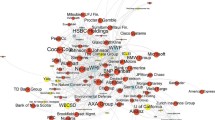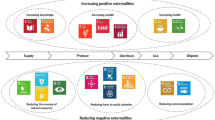Abstract
The shrimp-turtle case and the angry reactions it produced both inside and outside the WTO are only one striking example of the explosive force with which environmental policy disputes can shake the world trade system. Given a world whose economies are more closely linked and where environmental problems extend over national borders, it is to be expected that interest groups increasingly concentrate on influencing the institution which is dedicated to promoting international trade, the WTO.
Similar content being viewed by others
References
The Report can be read on the WTO's website, at: http://www.wto.org.
For an extensive jurisprudential assessment of the case, see: Robert Howse: The Turtles Panel. Another Environmental Disaster in Geneva, in: Journal of World Trade, Vol. 32 (1998), No. 5, pp. 73–100.
Cf., e.g., Matthew Stilwell, Charles Arden-Clarke: The WTO Shrimp-Turtle Ruling: International Trade versus the Global Environment, in: WWF International Tt al. (eds.): Dispute Settlement in the WTO: A Crisis for Sustainable Development, Discussion Paper, Geneva 1998.
Gregory Shaffer: The U.S. Shrimp-Turtle Appellate Body Report: Setting Guidelines toward Moderating the Trade-Environment Conflict, in: BRIDGES Between Trade and Sustainable Development, Vol. 2 (1998), No. 7, pp. 9–12.
Cf. Gregory Shaffer, op. cit. The U.S. Shrimp-Turtle Appellate Body Report: Setting Guidelines toward Moderating the Trade-Environment Conflict, in: BRIDGES Between Trade and Sustainable Development, Vol. 2 (1998), No. 7, pp. 9–12.
Internet address: http://www.ictsd.org
Cf. Daniel C. Esty: Greening the GATT. Trade, Environment, and the Future. Institute for International Economics, Washington, D.C. 1994, pp. 26f.; Peter Wahl: NGO-Multis, McGreenpeace und Netz-werk-Guerilla. Zu einigen Trends in der internationalen Zivilgesellschaft, in: Peripherie, 1998, No. 71, pp. 55–68.
Cf. Andreas Knorr: Umweltschutz, nachhaltige Entwicklung und Freihandel: WTO und NAFTA im Vergleich, Stuttgart 1997.
BRIDGES Weekly Trade News Digest, Vol. 2 No. 39 (October 12, 1998).
Cf. Axel Michaelowa: Climate Policy and Interest Groups—A Public Choice Analysis, in: INTERECONOMICS, Vol. 33 (1998), No. 6, pp. 251–259.
Cf. Daniel C. Esty, op. cit., pp. 36 f.
Cf. WTO Focus, No. 32, July 1998.
Cf., e.g., Peter J. Lloyd: The Problem of Optimal Environmental Policy Choice, in: Kym Anderson, Richard Blackhurst: The Greening of World Trade Issues, New York etc. 1992, pp. 49–72.
Cf. Hannelore Weck-Hannemann: Politische Ökonomie des Protektionismus. Eine institutionelle und empirische Analyse, Frankfurt am Main 1992, p. 34.
For more extensive investigations, cf. Hannelore Weck-Hannemann, op. cit. Politische Ökonomie des Protektionismus. Eine institutionelle und empirische Analyse, Frankfurt am Main 1992, p. 34. or Dani Rodrik: Political Economy of Trade Policy, in: Gene M. Grossman, Kenneth Rogoff (eds.): Handbook of International Economics, Vol. III, pp. 1457–1494, Amsterdam etc. 1995.
Cf. Bernard Hoekman, Michel Kostecki: The Political Economy of the World Trading System. From GATT to WTO, Oxford 1995, pp. 27–30.
Cf.,ibid. Bernard Hoekman, Michel Kostecki: The Political Economy of the World Trading System. From GATT to WTO, Oxford 1995, pp. 27–30.
Cf., e.g., Horst Siebert: Economics of the Environment. Theory and Policy, 3rd ed., Berlin etc. 1992.
Cf. Horst Siebert, Ep. cit. Economics of the Environment. Theory and Policy, 3rd ed., Berlin etc. 1992. p. 189.
Cf. Sigrid Meyer: Ökonomische Theorie der Umweltpolitik. Der Erklärungswert der Neuen Politischen Ökonomie für umweltpolitische Entscheidungsprozesse, Bergisch Gladbach & Cologne 1996, pp. 133 ff. Specifically on the issue of climate policy, see also Axel Michaelowa, op. cit. Climate Policy and Interest Groups—A Public Choice Analysis, in: INTERECONOMICS, Vol. 33 (1998), No. 6, pp. 251–259.
Cf. Bernhard Hoekman, Michael Leidy: Environmental Policy Formation in a Trading Economy: A Public Choice Perspective, in: Kym Anderson, Richard Blackhurst, op. cit. The Greening of World Trade Issues, New York etc. 1992, pp. 49–72. see also Sigrid Meyer, op. cit. Ökonomische Theorie der Umweltpolitik. Der Erklärungswert der Neuen Politischen Ökonomie für umweltpolitische Entscheidungsprozesse, Bergisch Gladbach & Cologne 1996, pp. 133 ff.
Cf., e.g., Kym Anderson: The Standard Welfare Economics of Policies Affecting Trade and the Environment, in: Kym Anderson, Richard Blackhurst: op. cit. The Greening of World Trade Issues, New York etc. 1992, pp. 49–72., who writes in this tradition of theory. The OECD also recently published a study taking much the same line: OECD: Open Markets Matter. The Benefits of Trade and Investment Liberalisation, Paris 1998.
Cf. Mancur Olson: The Logic of Collective Action. Public Goods and the Theory of Groups, Cambridge etc. 1965, for the classic text in this field.
On this topic, cf. Carsten Helm: Sind Freihandel und Umweltschutz vereinbar? Ökologischer Reformbedarf des GATT/WTO-Regimes, Berlin 1995.
Cf. Margareta Kulessa: Umweltpolitik in einer offenen Volkswirtschaft. Zum Spannungsfeld von Freihandel und Fmweltschutz, Baden-Baden 1995.
Cf., e.g. Andreas Knorr, op. cit. Umweltschutz, nachhaltige Entwicklung und Freihandel: WTO und NAFTA im Vergleich, Stuttgart 1997. Arye Hillman, Heinrich W. Ursprung: The Influence of Environmental Concerns on the Political Determination of Trade Policy, in: Kym Anderson, Richard Blackhurst, op. cit. The Greening of World Trade Issues, New York etc. 1992, pp. 49–72., demonstrates using a straightforward politico-economic model that environmentalists have an incentive in almost all conceivable cases to work in concert with protectionist industrial interests.
Cf., e.g., Andreas Knorr, op. cit. Umweltschutz, nachhaltige Entwicklung und Freihandel: WTO und NAFTA im Vergleich, Stuttgart 1997. p. 33.
Cf. Margareta Kulessa, op. cit. Umweltpolitik in einer offenen Volkswirtschaft. Zum Spannungsfeld von Freihandel und Umweltschutz, Baden-Baden 1995. pp. 69–74.
On this, cf. Steve Charnovitz: Environment and Health Under WTO Dispute Settlement, in: the International Lawyer, Vol. 32 (1998), No. 3, pp. 901–921, esp. p. 912.
For a number of proposals, see e.g. Daniel C. Esty: Greening World Trade, in: Jeffrey Schott (ed.): The World Trading System. Challenges Ahead, Institute for International Economics, Washington, D.C. 1996, pp. 69–85; see also Margareta Kulessa, op. cit. Umweltpolitik in einer offenen Volkswirtschaft. Zum Spannungsfeld von Freihandel und Umweltschutz, Baden-Baden 1995.
Steve Charnovitz, op. cit. Environment and Health Under WTO Dispute Settlement, in: the International Lawyer, Vol. 32 (1998), No. 3, pp. 901–921, esp. p. 912.
Author information
Authors and Affiliations
Rights and permissions
About this article
Cite this article
Liebig, K. The WTO and the trade-environment conflict. Intereconomics 34, 83–90 (1999). https://doi.org/10.1007/BF02927839
Issue Date:
DOI: https://doi.org/10.1007/BF02927839




